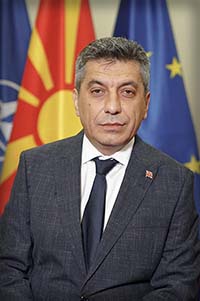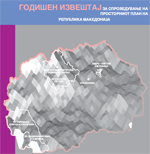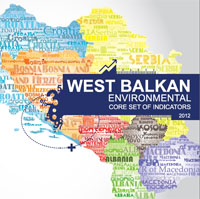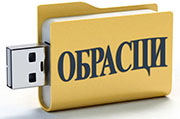 Macedonian Environmental Information Centre (MEIC) is Department within the Ministry of Environment and Physical Planning.
Macedonian Environmental Information Centre (MEIC) is Department within the Ministry of Environment and Physical Planning.
Information on environment is the starting point for any activity in the field of environment (e.g. information on the level of pollution, sources of funding targeted at environmental protection or activities of organization active in environment protection). For that purpose, i.e. for proper management of the process of collecting, processing, delivery and dissemination of environmental, the MEPP established the Macedonian Environmental Information Centre (MEIC) in April 1998.
The work of the Macedonian Environmental Information Centre is carried out through four units:
for air
quality monitoringUnit
for analysis
and reportingUnit
for cadastres
and modellingUnit
for information
technology
 Unit for ambient air quality manages the State Automatic Ambient Air Quality Monitoring System (SAAAQMS). SAAAQMS consists of 17 automatic ambient air monitoring stations set in the following cities: 5 in Skopje, two in each Bitola, Veles and Ilinden Municipality, one in each Kichevo, Kumanovo, Kochani Tetovo, Kavadarci and village Lazaropole. SAAAQMS also includes 10 samplers for 10 micrometer sized suspended particles and calibration laboratory.
Unit for ambient air quality manages the State Automatic Ambient Air Quality Monitoring System (SAAAQMS). SAAAQMS consists of 17 automatic ambient air monitoring stations set in the following cities: 5 in Skopje, two in each Bitola, Veles and Ilinden Municipality, one in each Kichevo, Kumanovo, Kochani Tetovo, Kavadarci and village Lazaropole. SAAAQMS also includes 10 samplers for 10 micrometer sized suspended particles and calibration laboratory.
The main tasks of the Unit include daily monitoringof data obtained from the State Automatic Ambient Air Quality Monitoring System and its validation and verification, regular maintenance and servicing of stations and samplers, replacement of filters, replacement of parts, manual calibration of instruments in stations, etc.
Calibration of analyzers from monitoring stations is also conducted in the Unit in order to obtain accurate data on air quality and calibration of reference analyzers from the calibration laboratory with the aid of static injection system for calibration.
The Unit also performs measurement and preparation of samples from the samplers and preparation of samples for chemical analysis of heavy metals in suspended particles and processing and analysis of obtained data. The Unit prepares information on the state of monitoring and quality of air. It further prepares daily, monthly and annual reports on the quality of air in the country based on data obtained from the SAAAQMS.
The Unit delivers notification in case of exceeded limit values and alert thresholds for individual air pollutants.
More details on SAAAQMS and the quality of air in real time can be found at the following link: http://airquality.moepp.gov.mk/
 The Unit performs activities and tasks related to collection, processing, analysis, presentation and reporting of data and information on environmental media and areas. It prepares daily, monthly, yearly and four-yearly reports on the state of and trends in environment and prepares thematic maps using geo-oriented data. The Unit coordinates the activities for cooperation of the Ministry with the European Environment Agency (ЕЕА) and delivers data and information to other international organizations, network and conventions in accordance with the requirements deriving from legislation and international agreements. Furthermore, the Unit developes, applies and expands the national set of environmental indicators and coordinates activities for establishment of task forces for all chapters. It delivers processed data and information for statistical database and statistical yearbook and for the purposes of other bodies and organizations in the country. The Unit takes active participation in the working groups within project activities carried out in the Ministry and working groups for implementation of the National Programme for EU Acquis Adoption.
The Unit performs activities and tasks related to collection, processing, analysis, presentation and reporting of data and information on environmental media and areas. It prepares daily, monthly, yearly and four-yearly reports on the state of and trends in environment and prepares thematic maps using geo-oriented data. The Unit coordinates the activities for cooperation of the Ministry with the European Environment Agency (ЕЕА) and delivers data and information to other international organizations, network and conventions in accordance with the requirements deriving from legislation and international agreements. Furthermore, the Unit developes, applies and expands the national set of environmental indicators and coordinates activities for establishment of task forces for all chapters. It delivers processed data and information for statistical database and statistical yearbook and for the purposes of other bodies and organizations in the country. The Unit takes active participation in the working groups within project activities carried out in the Ministry and working groups for implementation of the National Programme for EU Acquis Adoption.
 The Unit for cadastres and modelling prepares and maintains cadastres of environmental media, as well as part of the central database. For that purpose, the Unit coordinates and performs activities concerning design of individual surveys for specific areas, their distribution to polluters and collection, processing of data and its regular entry in specific cadastres in the central database, as well as cooperation with all relevant institutions possessing data on environment.
The Unit for cadastres and modelling prepares and maintains cadastres of environmental media, as well as part of the central database. For that purpose, the Unit coordinates and performs activities concerning design of individual surveys for specific areas, their distribution to polluters and collection, processing of data and its regular entry in specific cadastres in the central database, as well as cooperation with all relevant institutions possessing data on environment.
MODELING
With reference to modelling, the above said data is used for broadcasting and simulation of the quality of individual areas (air, water, waste) in order to obtain broadcast of the quality of environmental media. In this context, tests on computer modelling software, implementation of model data, identification of problems from temporal and spatial point of view, analysis of causes for model deviations, provision of diagram presentation of the pollutant concentration, comparative analysis and verification of data from measurements, as well as model data, analysis of data from social, economic and industrial development are conducted in the Unit.
Details of air quality modelling can be found on the following link: http://airquality.moepp.gov.mk/?page_id=3428
PRTR
The Unit is responsible for establishment, management, data entry in the central database and its presentation on compliant, integrated, national registers of pollutants release and transfer in accordance with the provisions of the Aarhus Convention – PRTR Protocol – Protocol on Pollutants Release and Transfer Register. This Protocol is multilateral agreement adopted at the Fifth Ministerial Conference of Environment in Europe held in Kyev, Ukraine in May 2003. It was developed under the Aarhus Convention on Access to Environmental Information, Public Participation in Environmental Decision Making and Access to Justice in Environmental Matters. The Convention was adopted at the Fourth Ministerial Conference of Environment in Europe held in 1998, in Aarhus, Denmark. It is a new kind of multilateral environmental agreement which links the areas of environment and human rights in a specific way. In accordance with the provisions of the Convention, the key elements of the PRTR system, its appearance, structure and scope have been elaborated, as well as the rules on the manner of data collection and storage, reporting, quality assessment, public access to information, confidentiality of data and information and public participation in Registers’ development, as well as international cooperation in this area.
 The main tasks of the Unit for information technology include: Provision of IT services to all employees of MEPP, maintenance of information infrastructure of the Ministry and development of the National Environmental Information System, as well as e-mail service for MEPP, provision of LAN and WAN services to MEPP, provision of wireless connection between different locations in MEPP, provision and maintenance of access to Internet, provision of firewall network protection, centralized protection against computer viruses, installation and configuration of newly procured equipment, editing and updating of contents on MEPP’s web portal, regular monitoring of the official MEPP’s e-mail address, technical preparation (desktop publishing) of brochures and reports of processed environmental data.
The main tasks of the Unit for information technology include: Provision of IT services to all employees of MEPP, maintenance of information infrastructure of the Ministry and development of the National Environmental Information System, as well as e-mail service for MEPP, provision of LAN and WAN services to MEPP, provision of wireless connection between different locations in MEPP, provision and maintenance of access to Internet, provision of firewall network protection, centralized protection against computer viruses, installation and configuration of newly procured equipment, editing and updating of contents on MEPP’s web portal, regular monitoring of the official MEPP’s e-mail address, technical preparation (desktop publishing) of brochures and reports of processed environmental data.
Maintenance and regular update of MEPP’s Web portal
In modern world, communication and information exchange are among the most important success factors in any organization. This is well argumented by the high extent of information technology development, making communication and information exchange simpler and available at any point of time.
Presentation of environmental data and communication is accomplished through the Ministry’s Web site – www.moepp.gov.mk.
All relevant information related to environment can be found on the site, including activities performed in the Ministry. The site is updated on daily basis. All events, campaigns, activities, laws and other activities related to the Ministry are published regularly.
The structure of the site reflects the structure of the MEPP.
Projects – www.uslugi.gov.mk , www.exim.gov.mk and ”Citizens Journal”
http://www.uslugi.gov.mk/ListaUslugi.aspx?OrganID=6ECE4E4D91DA40C28DA477E388066385
– The purpose of the Civil Journal is to contribute to the improvement of the quality of public services by way of defining the manner and the standard of service provision, including type of service, deadline and system of comments, appeals and complaints. The ultimate goal is to promote relationships between administration and citizens and reach satisfaction with the work of the Ministry of Environment and Physical Planning among citizens.
Development of National Environmental Information System (NEIS) is continuous process involving the following aspects:
– Implementation of the Environmental Data Management Strategy adopted by the Government of the Republic of Macedonia. The Strategy defines strategic priorities in NEIS development in institutional, technical and technological terms;
– Implementation of High Priority Action Plan prepared in the frames of the Project “Strengthening of Environmental Management” defining short and medium term steps for NEIS development.
Administration of MEPP web services
– Administration of EIONET TELEMATIC server of the Republic of Macedonia
– Administration of CIRCA (workgroup software) installed in EIONET server
Under the law, the Centre collects all information on the state of the environment from self-monitoring of different institutions and other sources, as well as from its own monitoring and makes them available to the public through its electronic information system (via WEB Site of MOEPP) and adequate information materials, such as: brochures, reports, etc. In this way, MEIC provides central archives of data on all environmental media and it can be used by all interested working on subject matters related to environment protection in the Republic of Macedonia.
The main function of MEIC is to provide relevant and properly processed (systematized and standardized), comprehensive, precise, transparent and easily accessible information on the state, quality and trends in all segments of environment (water, air, noise, waste).
Other prominent functions of MEIC include:
– Use of data from other information centres and statistical systems: geographical, topographical, population, economic, etc.;
– Collection of data of different nature, as well as support to main activities;
– Collection, systematization, analysis, processing and presentation of specific information on the state, quality and trends of environment (species, parameters for monitoring, sources, providers, formats, methodologies for quality assessment, equipment, hardware, software, databases, system structure, security, etc.).
– MEIC is also responsible for application of IT strategy, provision of technical support for system maintenance.
Besides the above, MEIC is actively involved in cooperation with other relevant bodies of the state administration and other partners having protection of the environment among their goals.



































































